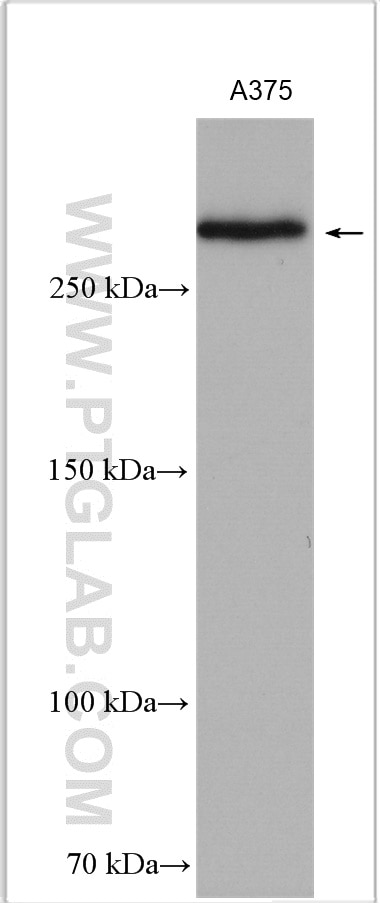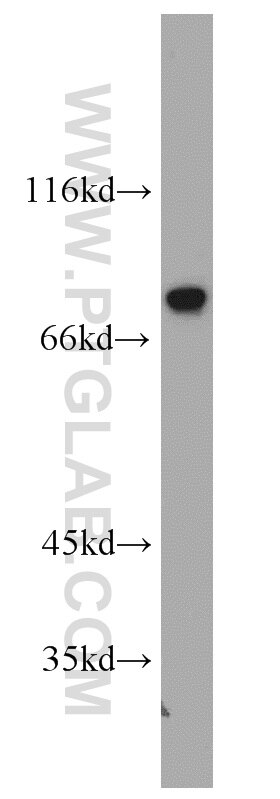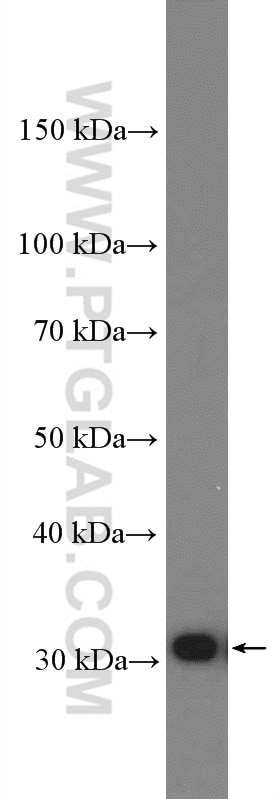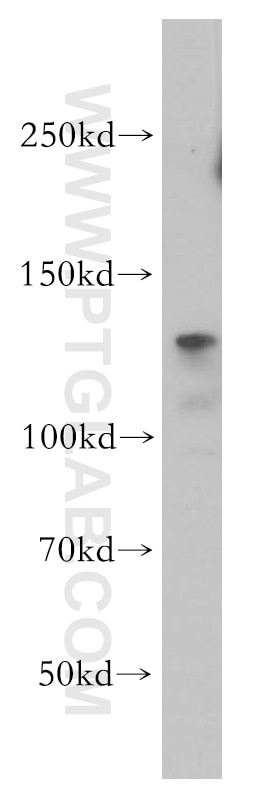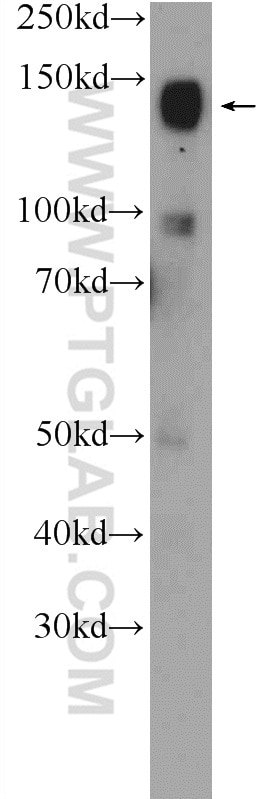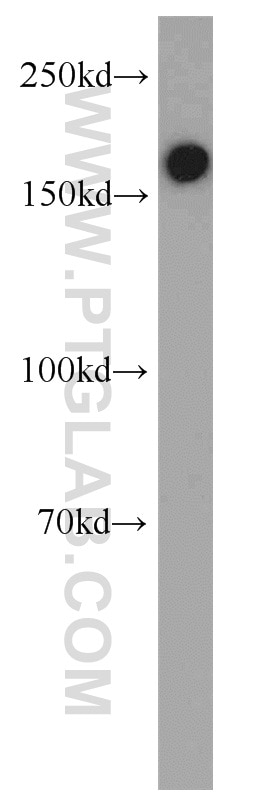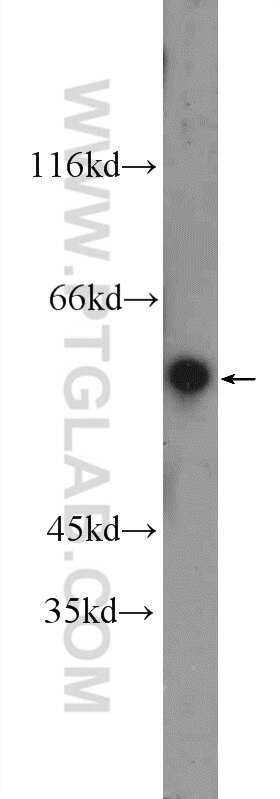CSPG4,NG2 Polyklonaler Antikörper
CSPG4,NG2 Polyklonal Antikörper für WB, ELISA
Wirt / Isotyp
Kaninchen / IgG
Getestete Reaktivität
human, Maus, Ratte
Anwendung
WB, IHC, FC, ELISA
Konjugation
Unkonjugiert
Kat-Nr. : 55027-1-AP
Synonyme
Galerie der Validierungsdaten
Geprüfte Anwendungen
| Erfolgreiche Detektion in WB | A375-Zellen |
Empfohlene Verdünnung
| Anwendung | Verdünnung |
|---|---|
| Western Blot (WB) | WB : 1:1000-1:4000 |
| It is recommended that this reagent should be titrated in each testing system to obtain optimal results. | |
| Sample-dependent, check data in validation data gallery | |
Veröffentlichte Anwendungen
| WB | See 6 publications below |
| IHC | See 3 publications below |
| FC | See 1 publications below |
Produktinformation
55027-1-AP bindet in WB, IHC, FC, ELISA CSPG4,NG2 und zeigt Reaktivität mit human, Maus, Ratten
| Getestete Reaktivität | human, Maus, Ratte |
| In Publikationen genannte Reaktivität | human, Maus, Ratte |
| Wirt / Isotyp | Kaninchen / IgG |
| Klonalität | Polyklonal |
| Typ | Antikörper |
| Immunogen | Peptid |
| Vollständiger Name | chondroitin sulfate proteoglycan 4 |
| Berechnetes Molekulargewicht | 251 kDa |
| Beobachtetes Molekulargewicht | 240-250 kDa, 450kDa |
| GenBank-Zugangsnummer | NM_001897 |
| Gene symbol | CSPG4 |
| Gene ID (NCBI) | 1464 |
| Konjugation | Unkonjugiert |
| Form | Liquid |
| Reinigungsmethode | Antigen-Affinitätsreinigung |
| Lagerungspuffer | PBS mit 0.02% Natriumazid und 50% Glycerin pH 7.3. |
| Lagerungsbedingungen | Bei -20°C lagern. Nach dem Versand ein Jahr lang stabil Aliquotieren ist bei -20oC Lagerung nicht notwendig. 20ul Größen enthalten 0,1% BSA. |
Hintergrundinformationen
CSPG4, also named as HMW-MAA, MCSP, MCSPG, MEL-CSPG, MSK16 and NG2, is a proteoglycan playing a role in cell proliferation and migration which stimulates endothelial cells motility during microvascular morphogenesis. CSPG4 may inhibit neurite outgrowth and growth cone collapse during axon regeneration. It is cell surface receptor for collagen alpha 2(VI) which may confer cells ability to migrate on that substrate. CSPG4 may regulate MPP16-dependent degradation and invasion of type I collagen participating in melanoma cells invasion properties. It modulates the plasminogen system by enhancing plasminogen activation and inhibiting angiostatin. CSPG4 functions as a signal transducing protein by binding through its cytoplasmic C-terminus scaffolding and signaling proteins. It promotes retraction fiber formation and cell polarization through Rho GTPase activation and stimulates alpha-4, beta-1 integrin-mediated adhesion and spreading by recruiting and activating a signaling cascade through CDC42, ACK1 and BCAR1. CSPG4 activates FAK and ERK1/ERK2 signaling cascades. The antibody is specific to CSPG4.
Protokolle
| Produktspezifische Protokolle | |
|---|---|
| WB protocol for CSPG4,NG2 antibody 55027-1-AP | Protokoll herunterladen |
| Standard-Protokolle | |
|---|---|
| Klicken Sie hier, um unsere Standardprotokolle anzuzeigen |
Publikationen
| Species | Application | Title |
|---|---|---|
Nat Cell Biol A global analysis of SNX27-retromer assembly and cargo specificity reveals a function in glucose and metal ion transport. | ||
Nat Commun FNIP1 abrogation promotes functional revascularization of ischemic skeletal muscle by driving macrophage recruitment | ||
J Pineal Res Melatonin pretreatment alleviates the long-term synaptic toxicity and dysmyelination induced by neonatal Sevoflurane exposure via MT1 receptor-mediated Wnt signaling modulation. | ||
Glia ST8SIA2 promotes oligodendrocyte differentiation and the integrity of myelin and axons. | ||
Commun Biol Complete remission of diabetes with a transient HDAC inhibitor and insulin in streptozotocin mice | ||
J Neuroinflammation NLRP3 inflammasome-mediated microglial pyroptosis is critically involved in the development of post-cardiac arrest brain injury. |
Rezensionen
The reviews below have been submitted by verified Proteintech customers who received an incentive forproviding their feedback.
FH X (Verified Customer) (07-11-2022) | Although there is a weak band at the right MW, there are many other strong nonspecific bands.
|
FH Kinan (Verified Customer) (04-22-2022) | No specific staining on human lung and skin sections. Background signal was very high also. HIER pH6 in citrate buffer.
|
FH Nadine (Verified Customer) (01-31-2019) | We had high background and no specific staining of IHC-paraffin slides of human brain cortex. We tried both pH6 and pH9 antigen retrieval solutions. We have not tested other applications.
|
